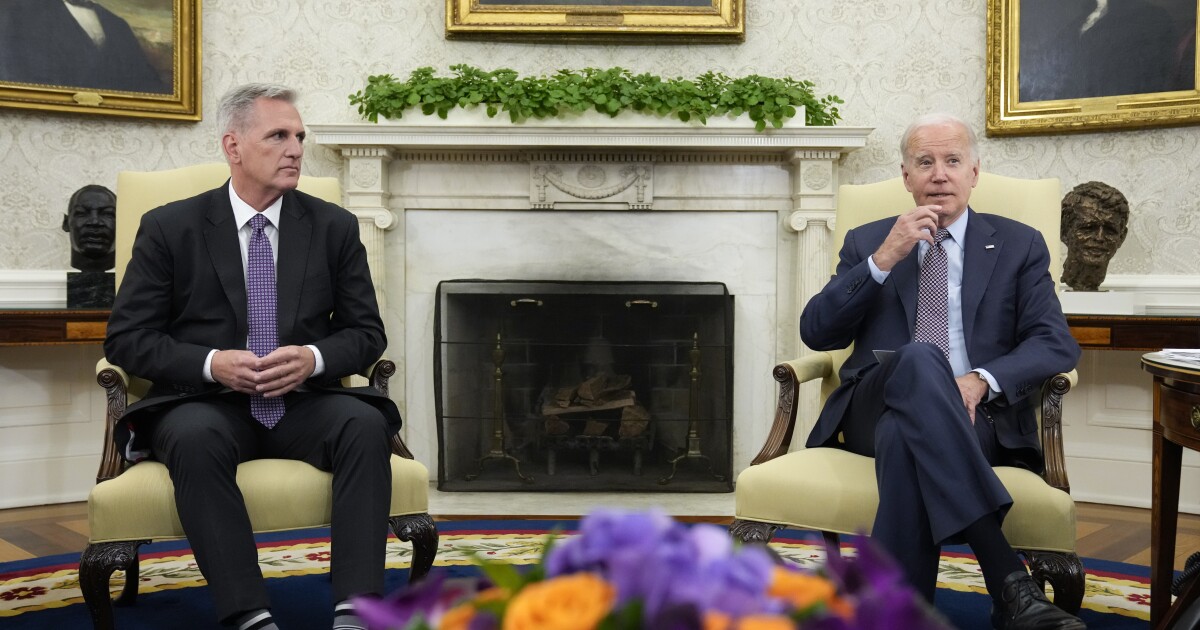

President Joe Biden has become increasingly vocal about congressional Republicans declining to discuss taxes as part of their debt ceiling negotiations.
But House Speaker Kevin McCarthy (R-CA) has declared tax increases a red line, attributing the country’s deficits to overspending and not a lack of revenue, 10 days before a potential default.
EVERYTHING YOU NEED TO KNOW ABOUT TIM SCOTT AHEAD OF HIS BIG 2024 ANNOUNCEMENT
Republican Study Committee Chairman Kevin Hern (R-OK), whose group has 176 lawmakers as members, underscored that tax hikes are “a nonstarter” for a bipartisan debt ceiling deal.
“Instead of discussing commonsense reforms to his out-of-control spending, Biden wants to raise taxes on energy producers heading into the hot summer months, worsen the impact of inflation on businesses, and surrender our sovereignty with a deeply flawed global minimum tax that could leave U.S. multinationals at a competitive disadvantage,” Hern told the Washington Examiner.
One senior Republican aide responded to Democratic criticism of the GOP for passing former President Donald Trump‘s Tax Cuts and Jobs Act in 2017, noting “record-high revenues” after it was enacted.
“It’s a wild strategy to insist on a clean debt limit, refuse to negotiate for months, and then at the last minute ask for something so completely absurd and tone-deaf,” the source said. “The Biden administration is clearly not taking this seriously.”
Biden’s second one-on-one White House meeting with McCarthy over the debt ceiling, their first solo sit-down since February, came after three hours of staff negotiations earlier Monday, in addition to talks last weekend following a “pause” last week amid tensions.
“We need to cut spending, but here’s the disagreement: I think we should be looking at tax loopholes and making sure the wealthy [pay] their fair share,” Biden said beforehand in the Oval Office beside McCarthy. “I think revenue matters, as long as you’re not taxing anybody [who is not making more than] 400,000 bucks.”
“We do have disagreements,” McCarthy replied. “We have a 50-year average [where] we’re having more revenue than at any time coming in.”
“The problem is — is not revenue, the problem is spending,” the speaker added outside the West Wing afterward during a Q&A session with reporters.
Another debt ceiling disagreement is a top-line spending level for next year before the Treasury Department‘s “X-date,” with Treasury Secretary Janet Yellen projecting again on Monday that the federal government will no longer be able to pay the bills it has already incurred as early as June 1. McCarthy has repeated, “We have to spend less than we spent last year,” while Biden would prefer to keep spending flat and for the Pentagon‘s budget to be cut too. Another disagreement is over work requirements for some welfare programs, such as food stamps and financial help for needy families.
Biden expressed frustration over the lack of debt ceiling tax negotiations, particularly closing the carried interest loophole, during a post-Group of Seven leaders meeting press conference in Japan, a trip that was cut short due to the default talks.
“I’ve done my part,” the president said, describing many of congressional Republicans’ proposals as “extreme” and “simply, quite frankly, unacceptable.” “It’s time for Republicans to accept that there is no bipartisan deal to be made solely on their partisan terms,” he went on. “They have to move as well.”
Biden reiterated his desire to tinker with the country’s “tax structure” in tandem with spending cuts, conveying to reporters he is cognizant of the debt ceiling’s political consequences, especially if there is a default.
“Let me be clear: I’m not going to agree to a deal that protects, for example, a $30 billion tax break for the oil industry, which made $200 billion last year … while putting healthcare of 21 million Americans at risk by going after Medicaid,” he said. “I’m not going to agree to a deal that protects wealthy tax cheats and crypto traders while putting food assistance at risk for nearly a hundred — excuse me — nearly 1 million Americans.”
CLICK HERE TO READ MORE FROM THE WASHINGTON EXAMINER
Earlier Monday, McCarthy dismissed concerns about the prospect of a speakership challenge over a bipartisan debt ceiling deal. He, too, emphasized the importance of reaching an agreement “this week to be able to pass it and move it to the Senate” but noted “nothing’s agreed to” yet.
“If you come to an agreement, it takes time to write it,” the speaker said. “In the House, we changed the rules so we make sure you get 72 hours so everybody can read it. Then you pass it in the House and you send it to the Senate. I think the Senate could probably act faster than I thought in the past, but we’re going to need a couple of days.”





